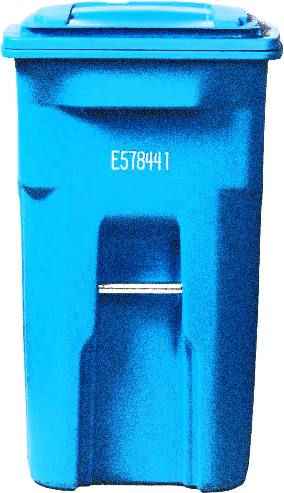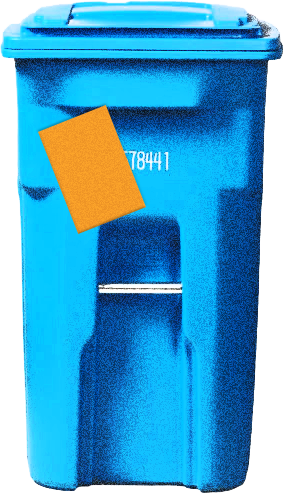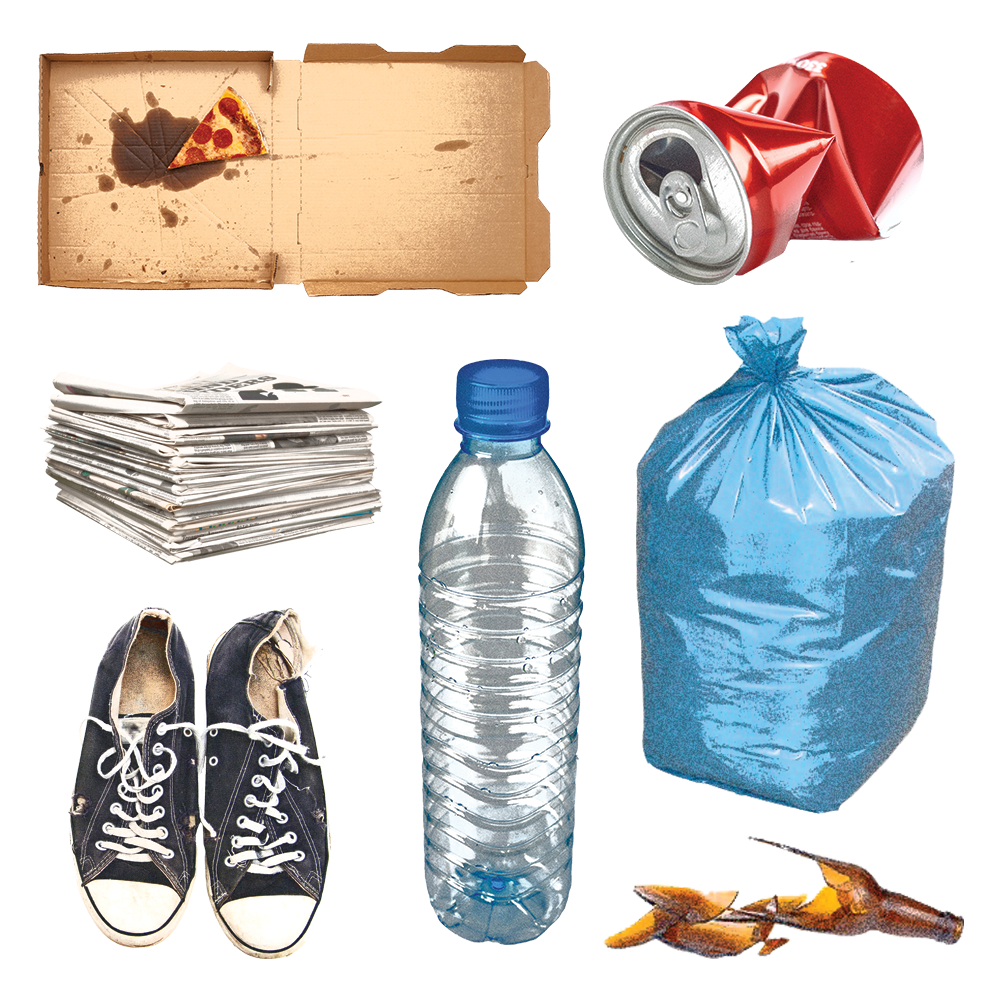Tons and tons of Chicago recycling isn’t getting recycled. And a private company is paid for it — twice.
Mayor Rahm Emanuel’s administration has allowed a private city recycling hauler to divert tons of residential plastics and paper into landfills the company owns, costing taxpayers twice and aggravating Chicago’s worst-in-the-nation recycling rate, a Better Government Association investigation has found.
This creates a distorted scenario under which the plastic, glass and metals of residents on the Northwest and Far South sides — areas where Texas-based Waste Management, Inc. holds the city’s recycling contract — are far more likely than other Chicagoans to see their discarded recycling dispatched to garbage dumps.
Under city rules, one plastic bag or food item improperly placed in a recycling bin could mean the whole bin is labeled “grossly contaminated” and its contents taken to a landfill.
Waste Management is the only recycling hauler that operates a for-profit landfill where a portion of the city’s garbage is dumped.
That means the company — which gets paid city recycling fees whether its crews pick up a bin or tag it — gets paid again on those occasions when the contents of tagged bins are taken by city trash crews to its landfill, the BGA investigation found.
Since 2014, private and municipal waste hauling crews labeled at least 577,886 recycling bins as “grossly contaminated” with improper items, records show.
Of those, 514,239 — almost 90 percent — were tagged by workers for Waste Management, even though the company’s green trucks cover only half the city.
That’s enough Blue Cart bins to completely fill Wrigley Field from the playing surface to over the top of the iconic manual scoreboard.
Waste Management officials declined to be interviewed, but in emailed responses to questions the company denied any financial motive behind the numbers.
“The overall premise of your story that we are purposely trying to divert materials to landfills is not true,” said company spokeswoman Lisa Disbrow. “Recycling contamination is an undeniable trend across the country. It is no different here in Chicago.”
The company also said the city — and not Waste Management — decides where to dump contaminated bins.
“We have no knowledge or control where the City trash trucks deliver the waste material from the tagged carts,” Disbrow wrote.
Waste Management cited several reasons it aggressively tags bins, including the damage some materials cause to its processing equipment, and its efforts to cooperate in the city’s program to better educate residents on what is allowable recycling.
Many residents interviewed by the BGA dispute the company’s claims they need to be educated, and instead say their bins are repeatedly tagged inappropriately.
“What’s the point in recycling if they’re not even going to pick it up?” asked Peter Bencak, 67, a Wicker Park resident whose blue bins have been tagged as being contaminated seven times since late 2015. “My cans are never contaminated.”
As he demonstrated in a recent interview with a reporter how diligent he is about cleaning and sorting recycling, Bencak described a recent phone complaint he made to Waste Management.
“I said, ‘Listen, you’re calling me a liar and I’m telling you I’m not contaminated and I’ve never been contaminated. So if you’re telling me I am, then your man is lying to you,’” Bencak said.
Linda McKillop, 71, whose Portage Park recycling bin was tagged once in 2016, said she called the city to explain how carefully she sorts her recycling.
“I was so aggravated, and I could not get over it,” she said. “I really think the city of Chicago is being ripped off with how they’re handling recycling.”
A “poorly run” program
Chicago’s residential recycling program has long been hampered by poor performance and neglect, beginning with the failed Blue Bag program under former Mayor Richard M. Daley. Emanuel from his earliest days in office vowed sweeping improvements through strict oversight and “managed competition” — pitting two private haulers against the city sanitation crews.
With great fanfare, Emanuel in 2011 announced his managed competition to pick the best provider of recycling services throughout the city and to finally expand recycling to every home after decades of hiccups. The mayor described the plan as his “commitment to protecting every cent of taxpayer money” that would make recycling both greener and cheaper.
“Whoever has the best price, most reliable service, in the end of the day they’ll win,” Emanuel told reporters at a 2011 press event. “But most importantly, the city taxpayers will win.
“It will be an evaluation of reliability of service and consistency of service, the quality of service as well as the price,” Emanuel said at the time.
The BGA investigation, however, found that Emanuel’s reforms have hardly been managed or competitive — a key reason why the city’s residential recycling rate has declined since 2013 and now stands at just nine percent. That is by far the lowest of any major metropolitan area in the country, with Houston’s second lowest rate of 17 percent still nearly double that of Chicago’s, the BGA found.
That something was starkly amiss has been lamented for years among Streets and Sanitation ward bosses, publicly lampooned by aldermen and readily apparent based on hundreds of complaints to the city from residents such as Bencak, the BGA found.
“It’s probably one of the most poorly run programs in the city,” said Ald. Scott Waguespack, 32nd, a longtime Emanuel critic. “No one has seen anything out of this managed competition on a year-to-year basis to see if they’re in compliance, if we are getting the lowest cost for our services or getting the actual recycling done.”
Emanuel declined to be interviewed for this report.
But officials in his administration defend his Blue Cart initiative, arguing that his managed competition initiatives have saved city taxpayers $10 million per year and the Department of Streets and Sanitation continues to “closely monitor” the program to “maintain balanced and cost-effective recycling service across the City.”
City officials say contaminated recycling bins comprise a tiny fraction compared to more than half-million tons of recyclable waste diverted from landfills since 2011. What’s more, they say the city recently renewed efforts to improve contamination labels and better educate residents about what to recycle.
“The managed competition model has supported the full expansion of the City’s Blue Cart program and allowed the program to remain fully operational in a challenging commodities market,” a city spokeswoman said in an emailed statement.
Under the mayor’s competition program, Waste Management is one of two private haulers, assigned different zones to collect the contents of blue residential recycling bins from buildings with fewer than five units. Waste Management covers three zones. Municipal workers cover two. The other private hauler is SIMS Metal Management, which subcontracts its collection work to Lakeshore Recycling Systems and covers one zone.
Emanuel promised to evaluate the competition within six months. After six years and counting, his pledge has yet to be fulfilled.
Records show the program has been running largely on auto-pilot since it began in 2011. There has been no declared winner of the “managed competition” and no comprehensive assessment of performance. Even so, both companies got a one-year contract extension from the Emanuel administration earlier this year.
Meanwhile, the administration failed to collect basic data it would need to reach any credible verdict on whether Waste Management, SIMS/Lakeshore or city Streets and Sanitation crews performed the work most efficiently.
The contracts with the private haulers require each to file monthly reports with the city detailing where recycling is ultimately taken, how much contaminated material in Blue Cart bins isn’t caught at the curb and must be sorted out at recycling centers, and how much taxpayer money is being rerouted to subcontractors.
The BGA made repeated requests to Streets and Sanitation officials to review those mandatory reports dating back to 2011. The department provided only a summary of 2018 data pertaining to SIMS/Lakeshore and acknowledged it lacked the rest of the files.
The city does not track the landfill destination of contaminated recycling bins, so it is impossible to determine how much went to Waste Management’s dump. City officials, however, acknowledge the company’s landfill receives some of the material.
The BGA calculated that if the contents of contaminated bins are flowing to Waste Management’s landfill at the same rate as does city garbage, about 5,000 tons of recyclables has been diverted to the company’s dump.
City officials in charge of overseeing the recycling programs said they don’t know why Waste Management tags so many more bins as contaminated. But they suggested it could be because the company has a more aggressive education campaign — an assertion that its competitor, Lakeshore, disputes.
“We just don’t reject that much stuff,” said Lakeshore CEO Alan Handley, who attributed his company’s low rate of contamination tags to Lakeshore’s hi-tech sorting facility. “We do just as much education as Waste Management does.
“Generally speaking we obviously don’t have the same issues that they seem to have.”
In the residential program, the haulers at both companies have discretion to decide when recycling bins are “contaminated.” Those bins are tagged and left for separate municipal crews to take to garbage dumps.
Chicago is the only major city that gives private haulers sole discretion to decide which recycling is diverted to landfills, the BGA found. The practice deviates sharply from other cities, many of which use only municipal collection crews, fine residents for chronic contaminations and give residents a second chance to have the contents of suspect recycling bins re-evaluated before the bins are hauled off to dumps.
San Antonio, Phoenix and San Diego, for instance, have dedicated teams of inspectors assigned to deal with contaminated bins. Houston requires haulers to pick up recycling whether the bins are contaminated or not.
San Jose — which reports a nearly 80 percent residential recycling rate, one of the nation’s highest — is the only other major city surveyed by the BGA that hires private contractors to pick up recycling. There, the private crews must either sort out contaminants from recyclables or give residents another chance to do it themselves.
While Chicago issues a general list of items that cannot be placed in recycling bins, it does not set out specific procedures about how strict haulers should be in tagging bins as contaminated, the BGA found.
Northwestern University researcher Joseph Schofer, who reviewed the contamination data at the BGA’s request, said he could reach no scientific conclusions without knowing what other factors might be causing such a disparity. But he added that the data itself suggests a lack of direction that encourages contractors to game the system to their advantage.
“If you don’t tell them what to do, then you let them do what they darn well please,” said Schofer, a professor of civil and environmental engineering. “There is a bias in the system and the city is giving up its opportunity to control that.”
A problem of education
Chris Sauve, the top Streets and Sanitation department official in charge of the recycling program, defends the Blue Cart program’s record, but acknowledges his office could do better.
He said his office has never probed why Waste Management accounts for the overwhelming bulk of contaminated bins even though it is assigned to pick up only half the city’s blue bins.
“Should measures be put in place to double check to make sure that the tags put out by the Waste Management crew are accurate? Yes,” said Sauve, a deputy commissioner in the department.
Sauve also conceded his office has never conducted a comprehensive review of contamination reports, but in an interview with the BGA earlier this year dismissed the notion that Waste Management would game the system to get paid twice.
“You could also say they are out there and they are more aggressive about educating residents about what they can’t put in their blue carts,” Sauve said.
Sauve said the real problem is educating residents, which his office is working to improve in cooperation with its recycling contractors.
“In 2014, Waste Management launched our ‘Recycle Often, Recycle Right’ program about why and how to recycle to increase recycling while addressing the confusion about what is recyclable and what is not,” the company said in a series of emailed responses to BGA questions.
In addition to being paid under city contract to pick up each recycling bin, the private recycling haulers also are allowed to sell the recycled material on the open market, beset by plummeting prices in the past couple years, according to Waste Management officials.
That dip in prices has coincided with a surge in contamination tags the company’s haulers have issued.
“There’s a financial incentive for them to say, ‘You know what? Let’s not pick this stuff up,’” Ald. John Arena, 45th, complained during a public City Council budget hearing last year. “‘Let’s let the city pick it up on their dime and then we’ll charge them to put it in our landfills.’”
A troubled past
Chicago’s recycling efforts have long-been marred by broken promises since they began in the 1990s under Daley — beginning with the notorious and failed partnership with Waste Management called Blue Bag.
Under that program, residents placed recyclables into blue-colored bags that were then dumped into regular trash cans. It was an abject failure, mired in scandal that included mob-tied subcontractors and City Hall number-fudging about recycling that was quietly diverted into garbage dumps.
After spending more than $200 million on Blue Bag, Daley replaced it in 2008 with Blue Cart, which in some ways follows a more common model in place in the Chicago suburbs and other big cities.
Waste Management, the largest garbage handling company in the nation, has a past filled with controversy dating back decades. In addition to its role in Chicago’s controversial Blue Bag program, the company endured numerous federal antitrust cases and settlements and one $6 billion investor fraud scheme in the 1990s that forced the ouster of five top executives who were forced to pay back more than $30 million dollars.
In 2014 — the first full year the Blue Cart program went citywide — the company accounted for about 70 percent of all contamination reports. But by 2017 and into the first half of 2018, the Waste Management share of those reports grew to 95 percent.
Pushing past the raw numbers, the disparity is even sharper when considering the rate at which Waste Management labels bins contaminated compared to its rivals.
In the first six months of 2018, records show, Waste Management tagged bins contaminated at a rate 20 times greater than the other crews combined.
For every 10,000 bins that Waste Management haulers service, 256 were tagged as contaminated during that time, records show. By contrast, Lakeshore and city crews combined tagged at a rate of 12 out of every 10,000 bins.
Those numbers back up anecdotal reports some alderman say they have been receiving from residents for years.
“We were hearing stories about Waste Management guys literally walking up and down the alley just slapping stickers and not even looking in the bins,” said Waguespack, whose ward on the North and Northwest sides sits on a border between zones operated by the company and city crews.
“The numbers were astronomical.”
In July Waguespack and Arena introduced a City Council resolution calling for a full audit of the recycling program as well as council hearings. He said he wants to finally conduct the evaluation Emanuel promised years ago.
Under their city contracts, Waste Management and SIMS/Lakeshore are required to file a report within 24 hours after tagging a recycling bin as contaminated. The BGA obtained a database of those reports under the Freedom of Information Act.
A spokeswoman for Streets and Sanitation said ward superintendents have been instructed to drive to each contaminated bin and conduct an on-site inspection to determine whether each tagging was appropriate.
“DSS investigates every report of recycling contamination and continues to closely monitor Blue Cart operations to maintain balanced and cost-effective recycling service across the City,” Marjani Williams wrote in an emailed statement.
When asked, however, she could provide no written copy of that directive.
One former ward superintendent interviewed by the BGA disputed the existence of such an inspection policy, and said it would be impossible to carry out given the sheer number of carts tagged as contaminated.
He said he took his concerns to supervisors at Streets and Sanitation, but was ignored.
“They were just closing their eyes and being blind to the situation,” said Ray Souchet, who was the 26th Ward superintendent before retiring in 2017 after more than 30 years with the city. Souchet said it was common knowledge that recycling bins were being inappropriately tagged and sometimes blocks of recycling were just skipped over entirely.
“I’ll be very blunt,” he said. “Sometimes they don’t even come for weeks to pick up in the alleys.”
This story was edited by David Kidwell. Photos by Madison Hopkins. Digital production and graphics by Patrick Judge.
Environmental reporting at the BGA is supported by Joel M. Friedman, President of The Alvin H. Baum Family Fund.


 It's not just about what you put in your bin.
It's not just about what you put in your bin.